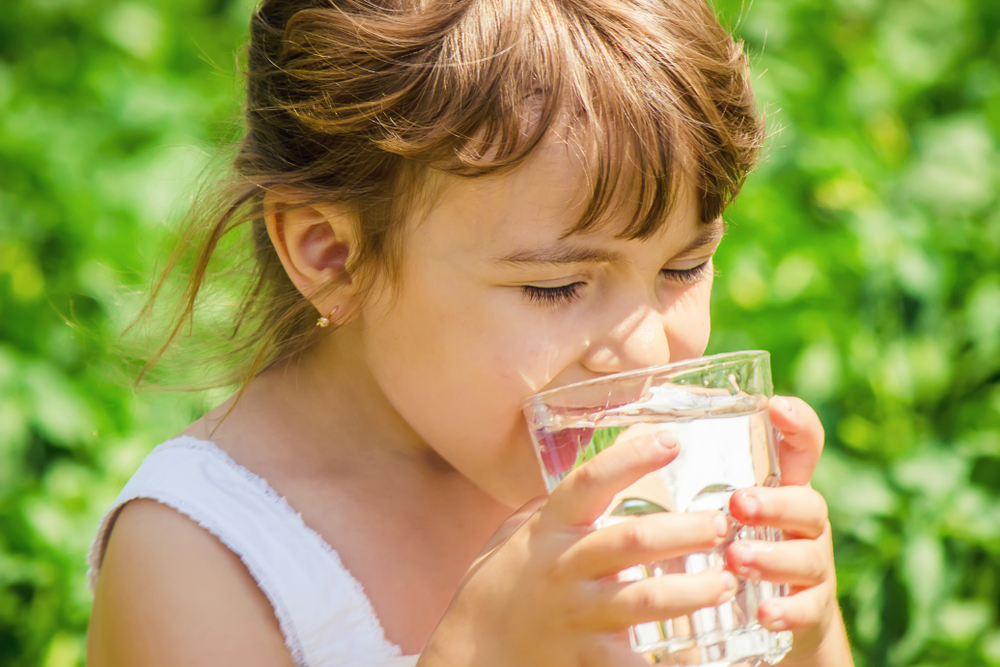
Splashing around in the pool, beach trips, bike rides, camping in the backyard and a ton of other super fun activities make summer holidays all about adventures. Getting your little ones to stay hydrated during all that fun in the sun is very important as they are at greater risk of dehydration, which occurs when the body loses more liquid than it takes in.
Infants and children are more likely than adults to become dehydrated because they have a higher body water content, an average of about 75%, than adults, who have around 60% in their bodies. Additionally, children have higher metabolic rates and increased body surface area to mass index, which contribute to their higher turnover of fluids and solute. Consequently, they require proportionally greater volumes of water than adults to replace the water they have lost and maintain their fluid equilibrium.
“Hydration is particularly important for children as they need more water during the day for many reasons among which are: their fast growth rate, higher water percentage of their body and being generally more active than adults,” Dr. Carla Habib Mourad, Clinical and Community nutritionist and the Nutritional Behavior Change Expert for Nestlé for Healthier Kids, says.
Plus, children don’t always realise they are thirsty, have a tendency to forget to drink and may be too young to get their own drinks. Luckily, making sure your child drinks enough water during the day, especially in hot weather, during and after exercise or when suffering from vomiting and/or diarrhea, can be made a lot easier with a few tricks that make glugging down the source of life more fun.
“Children usually don’t ask for water as the first option when they are thirsty, and parents need to make it available and fun for them to ask for,” Joumana Al Dabbagh, Nutrition Specialist at Nestlé Middle East, says.
Here are some of Dabbagh’s top tips to get your kids drinking more:
1- First choice: Make water your child’s first choice. When you do provide other beverages such as fresh fruit juices, do so in moderation to avoid the empty calories and extra sugar that can lead to tooth decay.
2- Variety: Try adding slices of fruits such as lemon or orange to water or freeze fruits like berries in ice cubes for a tasty infusion.
3- Fun Choice: Let your kids choose their own drink bottle or serve water in colourful glasses or jugs.
4- Fruitful offerings: Offer your child fruits and vegetables that have a high-water content such as cucumbers, tomatoes, watermelon and strawberries.
5- Encouragement: Remind your child to drink water before, after and during physical activity. The goal is to drink half a cup to two cups of water every 20 minutes while exercising even if your children claim they aren’t thirsty.
6- TUMMYFISH App: Nestlé for Healthier Kids TUMMYFISH App encourages children to drink more water in a fun way. The educational app features a fish swimming in a child's tummy that becomes happier and more vigorous when water is chosen over unhealthy drinks.
How much water do children need to drink daily?
While most experts recommend an average of eight glasses a day, there isn’t a really hard and fast rule. Research by The World Health Organization has shown that it is relative to the amount of activity you do and the climate you live in. Here are some figures according to the Institute of Medicine of the National Academies:
- 4 to 8 years: Girls and boys need 7 total cups of water
- 9 to 13 years: Girls need 9 total cups of water
- 9 to 13 years: Boys need 10 total cups of water
Here are some ways to tell if your child is dehydrated:
- Headaches or nausea
- Bad concentration
- Thirst
- Cracked lips
- Dry mouth
- Constipation
- Lethargy
- Dark yellow or brown urine
Did you know?
Water has many important functions in the body, including; regulating your body’s temperature, digesting food and excreting waste. Your body loses water throughout the day when you sweat, breathe and urinate.
















